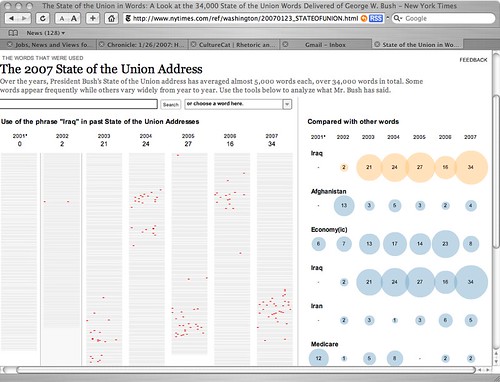Whew. We finally got here to our new house in Greenville yesterday. ABF should be bringing our stuff in a few days.
Also, I recommend that you go and check out this post of Holly's about the personal and the political. I have more to say about it, but I'll have to write that post later. For now, I'll just say that I've been thinking a lot about what "political discourse" is, and how it's interpreted and misinterpreted. I'm toying with the idea of doing maybe a weekly post under the rubric of "the political discourse awareness project," in which I link to a couple of posts that I consider to be political discourse, but perhaps many others wouldn't recognize them as such. Then I'd do a bit of explanation of why I think they count as political discourse. Here are a couple:
Badger's essay about trying to get health care coverage for her late husband's illness. This was a precise point at which government (SSI, Medicaid) met the personal.
Then there's this post at Raising WEG about children's shoes and clothes. Here are some excerpts:
Did you know that Payless didn't make a single athletic sandal for "youth" girls (wearing sizes 10.5 to 4.5) this year? All our old "girly" sandal standbys, Dora and Strawberry Shortcake and Disney Princess, are only available in toddler sizes, through size 12. Once girls reach kindergarten, however, their mainstream sandal choices narrow down to a few strappy sandals -- most of them with small heels -- or flip-flops.
How did I not notice this? All week long during VBS activity time, we had four- and five- and six-year old girls tripping over cement walkways and running too carefully through the grass as they tried to negotiate athletic activity while wearing flip-flops. This is probably a peak age for the embrace of all things girly, and when these girls go to buy shoes, they no longer fit into the clunky Princess sandal that gives them enough traction to climb trees, kick balls, or just climb a standard set of stairs without worrying about walking right out of their shoes.
No, instead they find a light-up Princess thong. They find an entire shelf full of flip-flops, espadrilles, and thongs.
There is one single youth-sized rugged sandal marketed to little girls at Payless. It has a one-inch heel.
No little girl can grow to adulthood in American without learning the cardinal rules of shopping. Of course everything about girls' clothing signals the importance of buying new clothes as often as possible. The US economy might crash to a standstill, if ever girls started expecting to buy the thick cotton t-shirts over in the boys' and mens' departments. Imagine what might happen, if my daughters' Target t-shirts had held up to more than a season's worth of washings. Their drawers might be filled with two-year old t-shirts, as their brother's are -- and we certainly can't have that.
I'd like to write that I've given up wondering why preschool girls need to show all of their thighs while wearing shorts, but preschool boys get to ward off cancer-causing skin rays with shorts that come down to their knees. But it would be a lie. Every time I think about this, I get a little apoplectic. There is no physiological difference between the waists, hips, and thighs of preschool boys and girls. What perverse set of sexual standards do we embrace when we teach our four-year old girls to show four times more skin than their brothers?
Have you ever considered how much more time girls have to spend getting ready to go outdoors than their brothers, because of the sunscreen issue alone? Thanks to his t-shirts with actual sleeves and nice long shorts, Wilder is out the door and playing before I have either one of the girls fully slathered.
I find this one to be political due to its far-reaching consequences. Freedom of movement is a fundamental freedom, and girls' freedom of movement is being compromised, subtly, every day. Arguably, this has implications for girls' confidence, physical strength, ability and willingness to protect themselves, consumption habits and economic standing, body image, Title IX, and more.
What do you think? Would you like to see me do a weekly "Political Discourse Awareness Project" post? Ideally this would be a collaborative effort; I'd love it if others would participate too.






